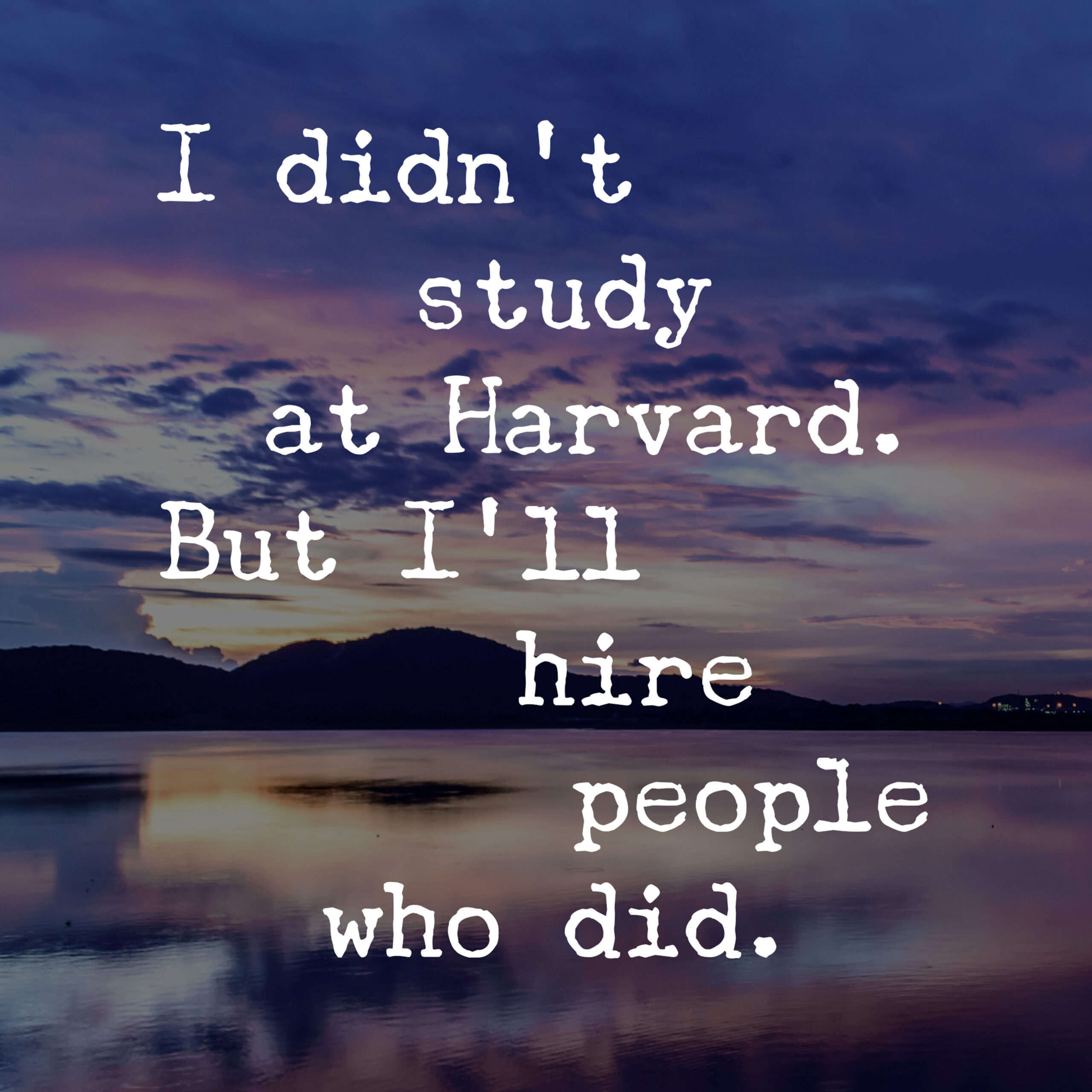The road to hell is paved with good intentions.
You might be searching for your “Dream Team” only to end up with a hiring nightmare.
This is what happens when you come into the hiring process with the wrong assumptions and outdated traditions.
For example, should your employees all come from Harvard or any of the top schools? Does this guarantee success?
If you ask one Malcolm Gladwell, you probably shouldn’t.
Relative Deprivation Theory
In his book, “David and Goliath,” Malcolm Gladwell, New York Times best-selling author, blithely talks about EICD or Elite Institution Cognitive Disorder—a phenomenon where people tend to look at graduates from top schools with rose-coloured glasses, favouring them over others.
(EICD is when recruiters throw the line, “We only hire graduates from the top schools.”)
But, is this the wisest way to go? Is hiring from the top school everything it’s touted to be?
Well, according to Gladwell, success at work is not just a function of your cognitive abilities. It is also a function of your relative standing in class. That is, in every class, there is a totem pole of students. Whether you’re from Australia National University or some low-tier college, there will always be a ranking of students.

According to Relative Deprivation Theory, students who enter Harvard (or any other elite institution really) think they are the best and brightest in the world. They are quickly disabused of this notion once classes start and rankings begin to crystallize.
This time, students from these institutions do not think in absolute terms (that they probably are some of the top students in the world), but in relative terms. “I’m dead last in this super class of 12!”
Four years of this thinking can so negatively affect the students that they come out of top universities wondering if they’re any good at all. Their self-confidence and self-efficacy are at an all-time low. (Even though they might be some of the best in the world.)
On the other hand, students from fairly average institutions, who top their classes, come out of the university full of confidence—applying to jobs with high self-belief and later on becoming successful at their jobs.
The numbers don’t lie.
When researchers looked into the number of journal articles published by the graduates of economics PhD. Programs (because that’s how they evaluate success in the field), they discovered that top students from average schools out-published most of the students from the Ivy League schools, (sometimes as much as 3x).
As it turns out, when it comes to your self-confidence and efficacy at work, it’s better to be a big fish in a small pond, than to be a small fish in a big pond.
According to “Relative Deprivation Theory,” if you’re going to hire for your company, you should take a closer look at class rankings. They can be a good predictor of how your new hire will perform at work.
Talent is Not Fixed. It’s Contextual.
Simon Sinek, motivational speaker and marketing savant, tells this story of a coffee barista at the Las Vegas Four Seasons named “Noah.” Noah was fun, engaging and friendly, prompting Simon to ask if he loved his job at the Four Seasons. Without skipping a beat, Noah said, “Yes,” and further explained how his managers were always asking if he was okay and if he needed anything to be more effective at his job.
Then Noah also volunteered the information that he also worked at a different hotel, and mentioned how he’s a different employee at that hotel. He’s the total opposite of what he is at Four Seasons. He simply keeps his head down, goes through the motions, and just waits for the day he picks up his paycheck.
He says the managers at this other hotel were hawkeyed on their mistakes, and they only get attention when doing something wrong. Everybody is watching their backs and terrified to make mistakes.
Same employee, different outcomes.
The difference is context. It can be the difference between the success and failure of a hire. “Harvard” or not.
You may land the best, but if you’re not going to give him the environment he needs to succeed, then you may have just hired a very expensive failure.
Many companies hire from the best schools and forget that they also need to give them the best training to be at the top of their game. Getting the best is not enough, you have to set them up for success.
Hiring for Cultural Fit Is Not Always Healthy.
Whether they admit this or not, companies and organizations tend to hire people who are practically clones of the people who are already inside. They then euphemize this as that person being “fit” for the culture of the company.
There’s nothing inherently wrong with this. People tend to hire folks they like and the people they usually like are people like them. That is people with the same academic pedigree, social circle and economic circumstance.
In the consulting world, they call this the “airport test.”
Future colleagues imagine, “Am I fine getting stuck at the airport for 12 hours with this person?” If the answer is, “Yeah,” then that’s one step closer to getting in.
But hiring for cultural fit may be the wrong way to go about surviving in a highly volatile and competitive field. Yes, it will make for less friction at meetings, but creativity will fall by the wayside. It will lead to “groupthink” where assumptions and orthodoxies are never questioned.
Innovation requires people who can look at things in a fresh way. The best hires, the ones who bring the most value to an organisation may be the very people who don’t fit the mould. They will challenge the old way of doing things, and create discomfort, yes, but hopefully, they will also bring about growth.
In today’s rapidly changing game, you will need to bring in players that will take the business to a different place.
Speaking of which…
“Employee” is Being Redefined.
In old corporate Japan, the culture is such that if you are welcomed into a company, you will probably stay there your whole life. Your son will also likely be working there, being loyal to the company that has provided you employment and fed your family for decades.
This is rare nowadays.
Millennials and Gen-Zers are especially prone to jumping from one company to another.
The world of work has shapeshifted into a gig economy, where an individual’s loyalties are but for a minute or for multiple businesses. For an organization to survive these quick personnel changes, the hiring frontlines should work on expedited processes. Or it risks having the hiring procedure be longer than the time the individual intends to stay.
Companies, if they are to remain relevant, will need to keep pace with the changes. The very nature of the business they’re in may change and require a different set of skills. So as mentioned earlier, the company must make itself conducive for success, whatever the role, regardless of whoever fills these roles…Harvard or not.

We’ve learned that there’s more to hiring than just looking at the “top schools.” Companies should be proactive in searching for candidates who can look at things with fresh eyes, who can spark innovation and who can encourage others to do the same. Businesses should also organize their resources and processes so that the new people who come in are nudged into productive excellence.
We at Kinetic Innovative Staffing help organizations, big and small, look for competent remote workers who bring value to the table. If you are on the hunt for your next online workers (eg. virtual assistants, customer service representatives, graphic designers, writers, web developers, accountants, engineers, social media managers, lead generation experts, etc.), Kinetic can take the guesswork out of the equation and help you land the best hire.
You can even create a whole team of remote workers and do it at a cost 70% lower than you would expect.
Ask us how.
Kinetic Innovative Staffing has been providing hundreds of companies in the Asia Pacific, North America, the Middle East, and Europe with professionals working remotely from the Philippines since 2013. Get in touch to know more.






